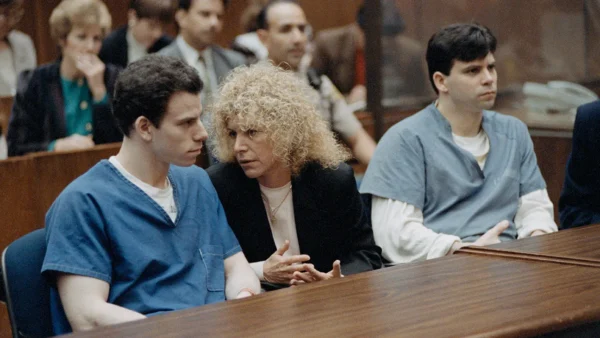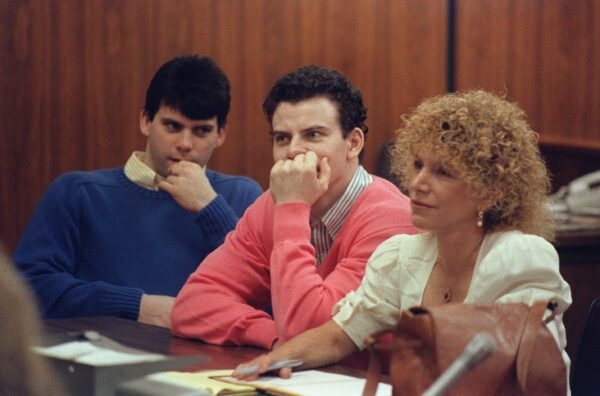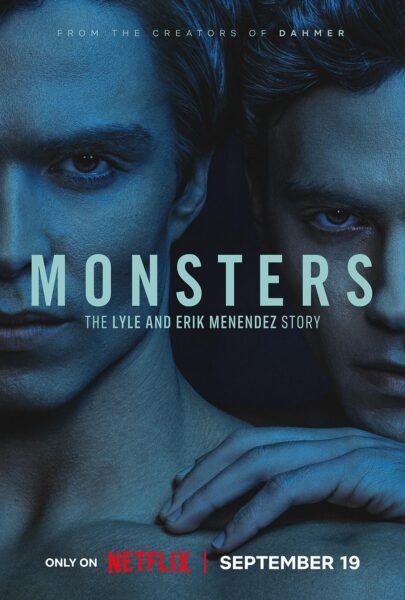On the night of August 20th, 1989, Lyle and Erik Menendez, 21 and 18, entered their Beverly Hills home with shotguns in their arms and took their parents’, José and Mary Louise ‘Kitty’ Menendez, lives. After waiting for the police to arrive to no avail, they buried the shotguns on Mulholland Drive. They went to the cinema to buy tickets for Batman, intending to use them as their alibi but then realized it would not work due to the timestamp on the stub. Finally, after going to the Taste of L.A festival at the Santa Monica Civic Auditorium, they headed back home, to still find no police. Lyle called 911 himself, and crying, said someone had killed his parents. When law enforcement arrived, they saw the brothers were so distressed, that they did not consider them as suspects.
What followed for Erik and Lyle Menendez were chaotic months, in which they were free, spending generously, but seemingly mentally unstable. During the beginning of 1990, seeking treatment for his severe depression, Erik confessed the killings to his therapist, Jerome Oziel. Oziel relayed this to his mistress, who eventually transmitted this information to the authorities. Following this, in March 1990, Erik and Lyle were arrested.

On the surface, and to many people following the coverage at the time, this case appeared like two privileged young men who had brutally murdered their parents for no apparent reason. Many assumed they were sociopaths. This would form part of the prosecution’s version of events. But as the world would see when their trial began in July 1993, Erik and Lyle, represented by attorneys Leslie Abramson and Jill Lansing respectively, would testify that they underwent a lifetime of sexual, physical, and psychological abuse at the hands of their parents.
As described, their father, José, was extremely unjust, cruel, and perverse. A businessman, Menendez used his position of authority and forcible bearing to intimidate, frighten, and humiliate the people around him into submission. In court, Erik and Lyle, along with over 50 witnesses, would testify how José would enact this same psychological torture on his sons, chronically.
This would be expressed in his relentless pressure for them to excel – in tennis, winning was the goal all the time, being trained rigorously since early childhood. In school, academic excellence was expected, and if not, the teachers were berated for it. Erik exhibited high anxiety levels over assessments, and up until high school would burst into tears in front of his peers if he was given a subpar grade. Lyle would bring his stuffed animals to school into his late teens. “They were soft. They made me feel safer,” he said.
The most shocking part of the defense was the sexual abuse alleged by both Erik and Lyle, primarily towards their father. Lyle said he was sexually abused by his father between the ages of 6 and 8, and Erik was abused from ages 6 to 18, up until their parents’ deaths. They underwent this while being threatened by their father that they would be killed if they told anybody.
This was corroborated by the brothers’ cousins, Diane Vandermolen and Andy Cano, who testified to both Lyle and Erik telling them at different points in their childhood about their father’s sexual molestation of them. The defense posed that this abuse culminated around a week before the killings when Erik admitted to his older brother that he was being sexually molested by his father. Lyle was furious and confronted José, telling him he would be publicly exposed if this continued. José responded with ominous threats and a cold demeanor, and Kitty reportedly told Lyle, “you ruined this family.” The brothers testified that by this point, they began to fear for their lives. They felt their parents planned to kill them for threatening to expose the lifelong abuse, which led Erik and Lyle to purchase shotguns and carry out the killing on August 20th.

The prosecution’s view rejected the so-called “abuse excuse”, posing that this was fabricated and insisting that the killings were motivated by a desire to receive their parents’ inheritance. Lead prosecutor Pamela Bozanich even stated that “men cannot be raped because they lack the necessary equipment to be raped.” The prosecution used the brothers’ lavish spending after the deaths to prove the financial motive, despite family members testifying that Erik and Lyle believed they had been taken out of their father’s will.
The public sentiment at the time overwhelmingly aligned with the prosecution. As the trial was televised, media coverage focused on questioning the abuse claims and portraying the brothers as spoiled rich kids gone violent. Oprah Winfrey plainly expressed that she did not believe the brothers crying on the stand, and Saturday Night Live aired a skit that openly mocked Erik and Lyle emoting for laughs.
In January of 1994, a mistrial was declared. Both juries (they had one jury each) could not reach a verdict. The brothers would be given a second trial with one jury, but Judge Stanley Weisberg ruled that this time around, the sexual abuse testimony had to be severely limited. Additionally, there was no option for a manslaughter charge – the brothers had to be convicted with first-degree murder, or entirely acquitted. This eventually led to the former, and the brothers were given life sentences without the possibility of parole. Erik and Lyle were put in different prisons, and they did not see each other until 2018 when Lyle was transferred to Erik’s correctional facility – 22 years of separation.
This brings us to now. The Menendez brothers have served almost 35 years in prison. There has been a resurgence of their case in social media for many reasons. The first is the reviewing of new evidence which came to light last year, when Roy Rossello, a former member of Menudo, a band that José Menendez managed, alleged that the brothers’ father had drugged and raped him when he was 14. A letter was also recovered that Erik wrote to his cousin Andy about 8 months before the killings, discussing the abuse by his father.
This has been coupled with Ryan Murphy’s Netflix series Monsters, which recounts the brothers’ story from differing perspectives. The series has undergone a significant amount of attention and backlash, due to its portrayal of events and the brothers. Erik himself put out a statement denouncing the series’ fictionalized version of events. Despite these complaints, it is undeniable that the series has played a part in the public’s eagerness to discuss the case again. Particularly Gen Z as well as older generations are examining the case retrospectively and recognizing its injustice. TikTok has been highly impactful in raising awareness about the case again. Lyle admitted this in The Menendez Brothers, the documentary released about the brothers in early October.

Now, there are three paths open for the brothers’ freedom. First is a habeas corpus petition filed in 2023, which asks for a review of evidence not presented at the original trials which could result in a conviction change. This has a hearing set for late November. The second is a resentencing recommendation issued by former Los Angeles District Attorney George Gascón, which he acknowledged was largely due to the new evidence and increased public awareness. This must go before a judge, and if through their examination of the case they agree (a hearing is set for December), it goes to the parole board for evaluation. If the board recommends a release, the decision goes to the California Governor Gavin Newsom. The resentencing possibility is now being reviewed by the newly elected D.A. Nathan Hochman. The third path opened up by the brothers’ defense attorneys in late October is a request for clemency to Newsom. This could lighten their sentence or grant a pardon, and consequently is the path favored by the brothers’ family and supporters. If this was approved the case would probably also go to the parole board for further evaluation.
The younger generation exhibits significant compassion and enthusiasm for Erik and Lyle to be freed. It is demonstrable that the public has much more knowledge about the traumatic effects of abuse and the inhumanity that these men went through as boys and young adults, which would make them believe they had no escape. Patriarchal notions about the sexual abuse of men were also much more present in the 90s, and, interestingly, most of their public mocking surrounded the degree of emotionality with which they spoke about the abuse. If other male victims saw this response, they would feel incredibly discouraged to speak out, which is already difficult to begin with.
It appears as if the public could not grasp that these young, wealthy men could be subjected to the most terrible acts. They did not look like the type of people we associate with victimhood. Now, we recognize this kind of thinking to be fallacious, and the Menendez brothers have received the most compassion they have ever had in their lives. As young people, it is essential to increase our understanding of mistakes committed in the past – even those we were not present for – and take a stand to correct injustices. We have the power to do so.




